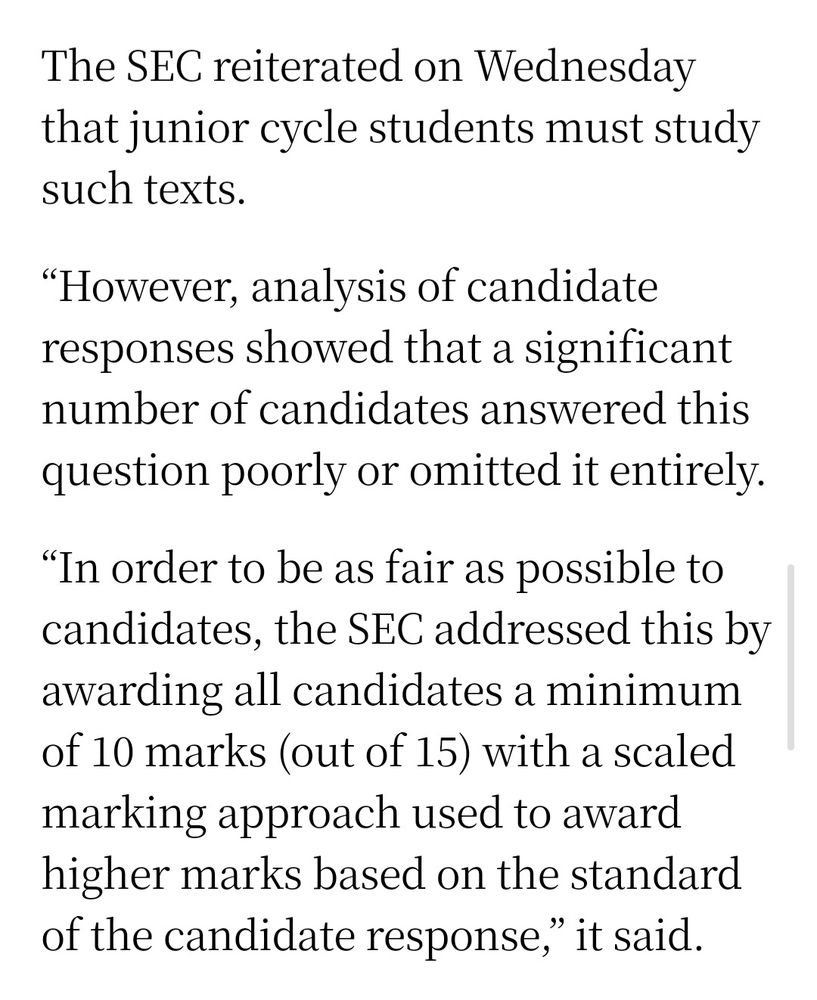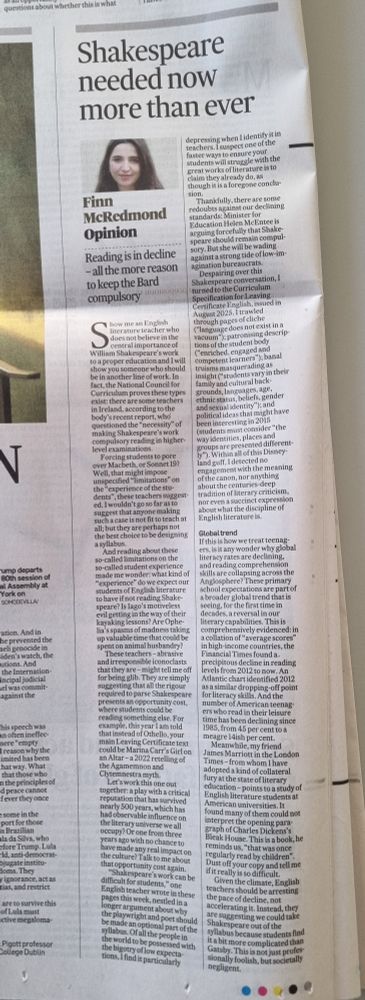
Here's a trailer for a doc called Brothers on Three about a West Point rugby team. Seems alright until you see a player jump out of a tackle...
(It's against the laws of rugby to jump out of a tackle)
youtu.be/hoX_CtU7p8c?...
@conorsmurf.bsky.social
English/Film teacher.

Here's a trailer for a doc called Brothers on Three about a West Point rugby team. Seems alright until you see a player jump out of a tackle...
(It's against the laws of rugby to jump out of a tackle)
youtu.be/hoX_CtU7p8c?...
What happened to Henshaw and Rignrose?
Why persist in trying to out muscle Munster?
Great win!
Was that a kick for 3 points or for Andy Farrel?
18.10.2025 17:28 — 👍 1 🔁 0 💬 1 📌 0
I wrote about how the exam has devolved into one aimed primarily at teachers, rather than one for students to show off what they have learned/developed.
The SEC response, above, indicates that I was correct.
thevideotrolley.blogspot.com/2025/06/juni...
The JC English Specification, and particularly the exam, now holds zero value amongst many teachers.
How can it?
Questions that students can't answer.
Questions with incorrect film terms.
Questions that require hours to answer but given minutes.
The whole thing is devoid of value



This is from today's Irish Times and reveals just how ridiculous the Junior Cycle English Specification is.
There's no way to cover all the material, yet we are expected to cover it all.
In the same sentence that short stories "non-literary" texts are mentioned.
How many?
What kinds?
No idea.
I'm not going to comment.
And by not commenting it seems that I have..

And the last one yesterday.
28.09.2025 17:03 — 👍 1 🔁 0 💬 0 📌 0
On Friday there was a reply in the letters page.
28.09.2025 16:42 — 👍 1 🔁 0 💬 1 📌 0Happy with all disagreements!
But, yes, that reply was...interesting.

And here's a reply to my article, also published in The Irish Times.
28.09.2025 14:49 — 👍 1 🔁 0 💬 2 📌 0
My article in Tuesday's Irsish Times asked whether it is time to make Shakespeare an option at Higher Level English rather than being compulsory, as he is now.
28.09.2025 12:27 — 👍 5 🔁 1 💬 1 📌 0
Fortnightly 192:
Nicholas Carr's 'Superbloom' | Rachel Cusk |
@j-amesmarriott.bsky.social on reading in crisis | @conorsmurf.bsky.social
on Shakespeare | @timothysnyder.bsky.social on Ukraine and kindness | AI guidelines from @irishsciteach.bsky.social
juliangirdham.substack.com/p/192-wherev...
I loved it.
The scenes from Robot's haircut through the party in the front garden are simply perfect. You sit back knowing you're in good hands.
Exceptional.
Just out of a screening here in Cork.
You can guess the reception.
Exceptional film.
I have been waiting a good many years for a new Shane Meadows to come along and it turns out he is Irish. Canty is a major talent.
19.09.2025 14:06 — 👍 6 🔁 1 💬 3 📌 0Thanks!
07.09.2025 12:25 — 👍 1 🔁 0 💬 0 📌 0Anyone know where I can get a DVD copy of Song of Granite?
Want to use it in school.
(Easier when it's a dvd)
Highest 2 Lowest doesn’t quite work. The pacing is off and the a turning point feels unearned.
But the film is fascinating in its exploration of culture, of doubles, of "class."
It's a film with lots to say, and lots for us to discuss.
Watch it.
To be fair though the oral is mentioned, and they don't seem capable of implementing it, so isn't this just a fantasy text?
02.09.2025 15:17 — 👍 1 🔁 1 💬 1 📌 0There are loads of issues left unanswered.
How, exactly, will the written AAC work in the world we live in and remain educational?
Can't see how they fix that one without turning it into a other exam.
Has Shakespeare been removed as a requirement for HL Leaving Cert English?
He's not mentioned in the new spec, published today.
He was in the Requirements section if the draft, but absent from it now!
www.curriculumonline.ie/getmedia/cea...
Thanks!
31.08.2025 19:29 — 👍 0 🔁 0 💬 0 📌 0
Fortnightly 190 is out:
Florence Knapp, Adrian Lester on Othello, R.C. Sherriff, Anne Enright and Joseph O’Connor on John McGahern, essays on Leaving Certificate English, Oscar Wilde's trials and more.
juliangirdham.substack.com/p/190-all-th...
This blog asks whether it's time for Shakespeare to be optional at Higher Level Leaving Cert English.
It opened up an interesting debate on Facebook, but not much on twitter.
Which is interesting.
thevideotrolley.blogspot.com/2025/08/is-i...
At a guess, rights issues.
Surprised they managed to get them all onto one platform.
Imagine an Art room with no paint.
A Home Economics class taking place in the woodwork room.
Metal work where they have to imagine the tools because they won't arrive for a few months.
Why?
Because it was rushed through.
Because it was announced without any research or planning
Drama, Film and Theatre, an LC subject, update:
1. No equipment
2. Last minute text change
3. Possibly no computers. Thus, no ability to actually complete the Film aspect of the course. (That's 50% of the course)
4. Schools still struggling with finding, adapting, rooms

Our latest episode is now online, with @conorsmurf.bsky.social and @natashawaugh.bsky.social joining us to talk about Celine Song’s “Past Lives”, which is on the new Drama, Film and Theatre Studies course on the Irish Leaving Certificate.
www.soundcloud.com/the250/431-p...

Our latest episode is now online, with @conorsmurf.bsky.social & @niallmurphy.bsky.social talking about "The Quiet Girl", one of the films on the new Leaving Certificate Drama, Film & Theatre Course.
We discuss the Irish language, stocism and - of course - biscuits.
soundcloud.com/the250/430-a...